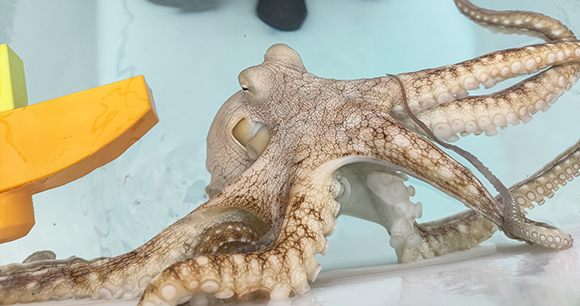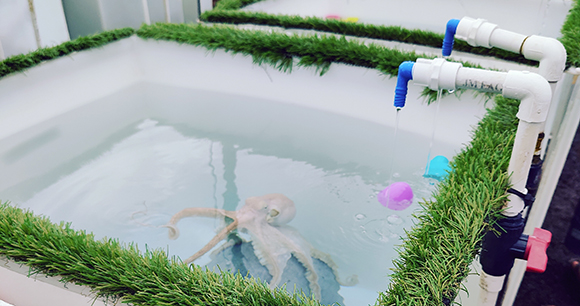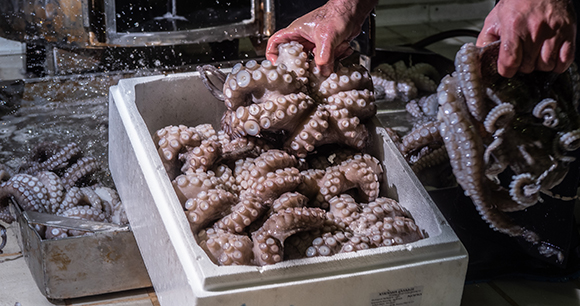
Octopuses inspire awe, wonder, and fascination. They are well-known for their creativity, intelligence, and curiosity. There is ample scientific evidence of their capacity to feel physical pain and experience distress. Yet, simultaneously, octopus meat is perceived as a delicacy food item. Efforts to establish large-scale industrial octopus farming represent a new and significant farmed animal welfare issue—potentially subjecting wild, carnivorous, sentient animal species to commercial exploitation and immense suffering.
While research related to developing an octopus farming industry has been underway for some time, the threat to octopus welfare became more immediate in 2021, when Spanish seafood company Nueva Pescanova announced plans for a large-scale commercial octopus farm in the Canary Islands. The previous year, My Octopus Teacher, an award-winning Netflix documentary, was released, and its charming portrayal of a common octopus (the same species Nueva Pescanova intends to farm commercially) may have contributed to widespread backlash to this proposal. Octopus farming has since received greater scrutiny from animal welfare and environmental organizations, scientists, and the public. The negative animal welfare and environmental impacts associated with octopus farming prompted Washington and California to ban the practice in 2024, and similar bans have been proposed in several other states and in Congress.
Octopus farming in the United States and globally
The now-closed Kanaloa Octopus Farm in Kailua Kona, Hawai‘i, was the only known octopus farm in the United States. Although advertised as a research facility and tourist attraction, there was an apparent intent to raise octopuses for meat and other products. Following exposure of the poor living conditions of octopuses at the facility, the farm was shut down by state authorities in 2023.
While there are currently no other active octopus farms in the United States, efforts to develop octopus aquaculture are underway in various countries around the world, including Mexico, Chile, China, Japan, Australia, and (as noted above) Spain. In some cases, these operations have been partially funded by public money through various government entities. Recent developments and plans (such as Nueva Pescanova’s) to expand commercial octopus farming warrant proactive measures to prevent this concerning practice from taking hold.

Scientific evidence of octopus sentience
A 2021 review of over 300 scientific studies by the London School of Economics indicated that there is “very strong evidence of sentience in octopods.” Based on the recommendations of this report, the United Kingdom expanded its Animal Welfare (Sentience) Act in 2021 to recognize all cephalopod mollusks (a group that includes octopuses) and decapod crustaceans as sentient animals.
In 2025, the Brooks Institute launched the “Living Bibliography Project,” with volume one presenting the latest scientific research on cephalopod cognition and sentience. Existing evidence indicates that octopuses can feel fear and stress and will change their behavior to avoid a painful experience or to alleviate existing pain with anesthesia. They can manipulate their environment and learn from past experiences. They also exhibit play-like behavior that is suggestive of positive emotions.
Welfare implications of octopus farming
In 2019, a letter signed by over 100 scientists asserted that “one consequence of understanding the octopus mind should be a refusal to subject octopuses to mass production.” The 2021 London School of Economics review cited above concluded that “there is no slaughter method for cephalopods that is both humane and commercially viable on a large scale” and that “high-welfare octopus farming is impossible.”
Octopuses are extremely unsuited to intensive farming for several reasons. They have large brains and sophisticated nervous systems. They are capable of problem solving, distinguishing between individual humans, engaging in playful behavior, outwitting predators, and even changing their color within seconds to blend in with their surroundings. There is even scientific evidence that suggests octopuses dream while they sleep. Due to their cognitive complexity, octopuses have high enrichment needs that cannot be met in intensive farming conditions.
Commercial octopus farms, however, would house octopuses in barren, crowded tanks under near-constant light—conditions that are in direct conflict with their nocturnal, solitary, territorial, and exploratory nature. Efforts to farm or raise octopuses in captivity have resulted in high rates of infection and mortality, self-cannibalism, and cannibalism of other octopuses. Even if farmed octopuses were tolerant of one another, confinement in small, sterile tanks with no stimulation or places to hide would lead to high levels of stress. It is impossible to provide acceptable welfare standards for farmed octopuses kept in these conditions.

There has been little research on how octopuses could be effectively stunned prior to slaughter. Much is still unknown about the mechanisms and effects of anesthesia on them (which, in any case, would not be an appropriate method of slaughter if the octopuses are meant for human consumption), or about how to reliably distinguish between immobilization and complete loss of consciousness.
Methods of killing wild-caught octopuses involve cruel and gruesome violence such as head clubbing, slicing the brain, impalement with a metals spear, reversing the mantle (the large, sac-like part of the body located behind the head), or asphyxiation induced by placement in a suspended net bag. In some places, live chilling in ice is apparently a common practice to prevent the release of stress hormones and improve the taste of the flesh. Farmed octopuses would likely be killed in similar fashion—via ice water submersion—a method known to cause a slow and painful death.
Impacts on marine ecosystems
Farming carnivorous animals such as octopuses results in a highly inefficient feed conversion ratio. A commercial farm would require a massive amount of fish, crustaceans, or other suitable food. This presents significant concerns regarding the impact on already-depleted wild fisheries and has the potential to negatively impact food security and environmental sustainability. A commercial octopus farm may also impact local marine ecosystems through the release of wastewater containing high levels of nutrients and other waste products. Crowded conditions and poor water quality in octopus farms could create conditions that lead to the spread of diseases. Antibiotics used to prevent the spread of diseases could also be released into the marine environment. With ocean health and marine ecosystems already under myriad threats, farming octopuses to produce a perceived food delicacy is not only cruel, it is ecologically unjustifiable.